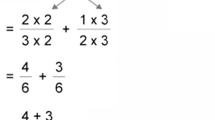Abstract
Based on cognitive load theory, this paper reports on two experiments investigating the variability effect that occurs when learners’ exposure to highly variable tasks results in superior test performance. It was hypothesised that the effect was more likely to occur using high rather than low levels of guidance and testing more knowledgeable than less knowledgeable learners. Experiment 1, which tested 103 adults studying pre-university mathematics, showed no interaction between levels of variability (high vs. low) and levels of instructional guidance (worked examples vs. unguided problem solving). The significant main effect of variability indicated a variability effect regardless of levels of instructional guidance. Experiment 2, which tested another group of 56 adults enrolled in the same mathematics program, showed an interaction between levels of variability (high vs. low) and levels of learner expertise (novices vs. experts). More experienced learners learned more from high rather than low variability tasks demonstrating the variability effect, while less experienced learners learned more from low rather than high variability tasks demonstrating a reverse variability effect. It was suggested that more experienced learners had sufficient available working memory capacity to process high variability information while less experienced learners were overwhelmed by high variability and learned more using low variability information. Subjective ratings of difficulty supported the assumptions based on cognitive load theory. The major educational implication is that learners should initially be presented with low variability or easier tasks, and as they gain more experience in the task domain, variability or task difficulty should increase.


Similar content being viewed by others
References
Atkinson, R. K., Derry, S. J., Renkl, A., & Wortham, D. (2000). Learning from examples: instructional principles from the worked examples research. Review of Educational Research, 70(2), 181–214. https://doi.org/10.3102/00346543070002181.
Bokosmaty, S., Sweller, J., & Kalyuga, S. (2015). Learning geometry problem solving by studying worked examples: effects of learner guidance and expertise. American Educational Research Journal, 52(2), 307–333. https://doi.org/10.3102/0002831214549450.
Carroll, W. M. (1994). Using worked examples as an instructional support in the algebra classroom. Journal of Educational Psychology, 86(3), 360–367. https://doi.org/10.1037/0022-0663.86.3.360.
Chen, O., Castro-Alonso, J. C., Paas, F., & Sweller, J. (2018). Undesirable difficulty effects in the learning of high-element interactivity materials. Frontiers in Psychology, 9(1483), 1–7. https://doi.org/10.3389/fpsyg.2018.01483.
Chen, O., Kalyuga, S., & Sweller, J. (2017). The expertise reversal effect is a variant of the more general element interactivity effect. Educational Psychology Review, 29(2), 393–405. https://doi.org/10.1007/s10648-016-9359-1.
Cooper, G., & Sweller, J. (1987). Effects of schema acquisition and rule automation on mathematical problem-solving transfer. Journal of Educational Psychology, 79(4), 347–362. https://doi.org/10.1037/0022-0663.79.4.347.
Geary, D. C. (2008). An evolutionary informed education science. Educational Psychologist, 43(4), 179–195. https://doi.org/10.1080/00461520802392133.
Kalyuga, S. (2007). Expertise reversal effect and its implications for learner-tailored instruction. Educational Psychology Review, 19(4), 509–539. https://doi.org/10.1007/s10648-007-9054-3.
Kalyuga, S., Ayres, P., Chandler, P., & Sweller, J. (2003). The expertise reversal effect. Educational Psychologist, 38(1), 23–31. https://doi.org/10.1207/S15326985EP3801_4.
Kalyuga, S., Chandler, P., Tuovinen, J., & Sweller, J. (2001). When problem solving is superior to studying worked examples. Journal of Educational Psychology, 93(3), 579–588. https://doi.org/10.1037//0022-0663.93.3.579.
Kalyuga, S., Rikers, R., & Paas, F. (2012). Educational implications of expertise reversal effects in learning and performance of complex cognitive and sensorimotor skills. Educational Psychology Review, 24(2), 313–337. https://doi.org/10.1007/s10648-012-9195-x.
Paas, F. G. W. C., & van Merriënboer, J. J. G. (1994). Variability of worked examples and transfer of geometrical problem-solving skills: a cognitive-load approach. Journal of Educational Psychology, 86(1), 122–133. https://doi.org/10.1037/0022-0663.86.1.122.
Quilici, J. L., & Mayer, R. E. (1996). Role of examples in how students learn to categorize statistics word problems. Journal of Educational Psychology, 88(1), 144–161. https://doi.org/10.1037/0022-0663.88.1.144.
Schwonke, R., Renkl, A., Krieg, C., Wittwer, J., Aleven, V., & Salden, R. (2009). The worked-example effect: not an artefact of lousy control conditions. Computers in Human Behavior, 25(2), 258–266. https://doi.org/10.1016/j.chb.2008.12.011.
Sweller, J. (1994). Cognitive load theory, learning difficulty and instructional design. Learning and Instruction, 4(4), 295–312. https://doi.org/10.1016/0959-4752(94)90003-5.
Sweller, J. (2004). Instructional design consequences of an analogy between evolution by natural selection and human cognitive architecture. Instructional Science, 32(1–2), 9–31. https://doi.org/10.1023/B:TRUC.0000021808.72598.4d.
Sweller, J. (2006). Discussion of ‘emerging topics in cognitive load research: using learner and information characteristics in the design of powerful learning environments’. Applied Cognitive Psychology, 20(3), 353–357. https://doi.org/10.1002/acp.1251.
Sweller, J. (2008). Instructional implications of David C. Geary’s evolutionary educational psychology. Educational Psychologist, 43(4), 214–216. https://doi.org/10.1080/00461520802392208.
Sweller, J. (2010). Element interactivity and intrinsic, extraneous, and germane cognitive load. Educational Psychology Review, 22(2), 123–138. https://doi.org/10.1007/s10648-010-9128-5.
Sweller, J., Ayres, P., & Kalyuga, S. (2011). Cognitive load theory. New York, NY: Springer. https://doi.org/10.1007/978-1-4419-8126-4.
Sweller, J., & Chandler, P. (1994). Why some material is difficult to learn. Cognition and Instruction, 12(3), 185–233. https://doi.org/10.1207/s1532690xci1203_1.
Sweller, J., & Cooper, G. A. (1985). The use of worked examples as a substitute for problem solving in learning algebra. Cognition and Instruction, 2(1), 59–89. https://doi.org/10.1207/s1532690xci0201_3.
Sweller, J., & Sweller, S. (2006). Natural information processing systems. EvolutionaryPsychology, 4(1), 434–458. https://doi.org/10.1177/147470490600400135.
Van Merriënboer, J. J. G., & Kirschner, P. A. (2018). Ten steps to complex learning: a systematic approach to four-component instructional design (3rd ed.). New York: Routledge. https://doi.org/10.1007/s11528-018-0254-0.
Author information
Authors and Affiliations
Corresponding author
Ethics declarations
Ethics Approval
All procedures performed in the study involving human participants were in accordance with the ethical standards of the Human Research Ethics Approval Board of the University of New South Wales, Sydney (Approval number 14074).
Additional information
Publisher’s Note
Springer Nature remains neutral with regard to jurisdictional claims in published maps and institutional affiliations.
Rights and permissions
About this article
Cite this article
Likourezos, V., Kalyuga, S. & Sweller, J. The Variability Effect: When Instructional Variability Is Advantageous. Educ Psychol Rev 31, 479–497 (2019). https://doi.org/10.1007/s10648-019-09462-8
Published:
Issue Date:
DOI: https://doi.org/10.1007/s10648-019-09462-8




